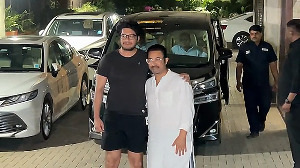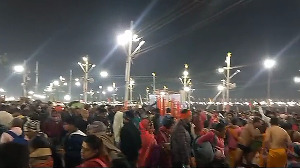"Do you know why India's information technology sector is so successfull? Because they don't have to travel on Indian roads or airports." Bimal Jalan, Governor, Reserve Bank of India
It was an event to honour K V Kamath, managing director and chief executive officer, ICICI Bank. But it was Reserve Bank of India Governor Bimal Jalan who stole the show when he tempered Kamath's euphoric remarks about India's likely economic successes in the coming decade with a warning that much can change in 10 years.
"A decade ago, the US economy was in great shape; Germany was doing well and Japan was progressing. Who then would have predicted that 10 years later their economies would be in decline?" said Jalan.
"We must not be complacent. No matter how good things are today, and they are good, we must take care to keep them that way. It takes years to build but a very short time to lose what has been built," said Jalan, who has been heading India's central bank since 1997 and is now expected to move on, presumably to a seat in Parliament.
The occasion was conferring the Outstanding Businessman of the Year Award on Kamath by the Mumbai-based Indian Merchants' Chamber. Jalan presented the award to Kamath, and both spoke about the state of the Indian economy.
Thanking the IMC Diamond Jubilee Endowment Trust for honouring and 'humbling' him with the award, Kamath said he saw winds of change blowing across India.
"I want to share with you my views about the changes. Today, we see a resurgent India, a globally competitive India. Our economic indicators show that resources are available and it is for industry to utilise them," he added.
He pointed out that India had come a full circle from the 1990s and that today, Indian firms were able to withstand global competition as well as any multinational. "The restructuring was painful but we have emerged stronger and are growing despite competition. In fact, foreign companies are making India a hub for their manufacturing operations," he said.
He also praised the growth of services, which he said had grown 25 per cent over the last five years and said this sector had immense potential, whether in research and design, or as call centres that were upgrading to provide value-added services.
Coming to his home turf of banking, he pointed out with rising consumer expectations, financial intermediaries were competing with each other and the best in the world to provide to fulfil these expectations. "This healthy competition between banks has led to prudential accounting norms and greater discipline," he averred.
"Today, I prefer to see the glass as half full and say that the other half needs to be filled. India is poised for a leap forward," he concluded to thunderous applause.
It was to this brimming optimism that Jalan addressed his note of caution. Perhaps the differences were age and perspective: Kamath was the younger man, who had led ICICI [then the Industrial Credit and Investment Corporation of India] into ICICI Bank Limited, one of India's largest universal banks and considered one of the globe's leading users of technology in the banking world.
On the other hand, Jalan is the economic administrator, remembered among other things for taking over as RBI governor even as the rupee was spiralling out of control against the dollar, forcing the RBI to intervene (paradoxically, Jalan is poised to leave RBI at a time when the rupee was gaining so much against the dollar that the RBI sold dollars to depreciate the rising rupee!), and a man who has seen India undergo much economic upheavals since Independence, something he reminded the audience.
"Please note, this is the first time since Independence that we do not have a balance of payment crisis and that our foreign exchange reserves [currently pegged at $83 billion]. We've had crises in the first, second, third, fourth, and fifth decade of our Independence 1956, '58, '64 when there was a drought, '71, '79, '84, '91, '93," Jalan said.
He insisted that he agreed with the optimism of Kamath that India's economy was doing well, that India's foreign exchange was overflowing and that now the country did not have a balance of payment crisis.
"For the first time, things are positive in the foreseeable future unless and we do something wrong, and let me assure you, we are capable of doing that!" he said much to the mirth of the audience.
"We still have a long way to go," he pointed out, and came down heavily on India's poor productivity quality. "We still have a great tolerance for sloth and inefficiency. India has surplus labour, but the problem with our labour is its low productivity. We are still too tolerant of non-delivery and that is our biggest problem."
He asserted that for India to achieve its potential in the next decade, the emphasis would have to be on infrastructure, and then quipped about the IT sector doing well since it avoided Indian roads and airports. "IT is just one sector. We need to do well in all the service areas. And we need to do more on education where I fear we are falling behind,:" he stressed.
But he also added that it was quite a change India's central bank, for the first time in its history, to not worry about less foreign exchange but about excessive excess foreign exchange in its reserves!
Jalan justifies cap on NRE interest rate
Bimal Jalan said the central bank had capped the interest rates on non-resident (external) rupee deposits to bring parity with Foreign Currency Non-Resident (bank) deposits and remove chances for arbitrage (taking benefit of interest rate differential in domestic and global market).
On July 17, the central bank capped the rate on fresh repatriable NRE deposits of one to three years at 2.5 per cent above London Inter-Bank Offered Rate.
"We do recognise opportunities for arbitrage benefits but have not seen it taking place," Jalan said.
On the foreign exchange inflows and its management, he said, "Inflows are not debt creating and there is no cost to us (RBI and the government)."
"For every dollar in reserves, the equivalent amount of rupees are released in the system, which should be used for investment," the governor said.
Commenting on exchange rate movements, Jalan said, "The two way movement of exchange rate are good and in-principal no one can disagree with it. But, there are no easy answers."
Asked about World Bank's warning of growth and fiscal slippages, he said, "I agree with the government's view that multilateral institutions' concern of gloom and doom about India was quite unfortunate at a time when all economic parameters were looking up."
- Get cracking on reforms, World Bank tells India
- Govt slams World Bank report, says India's growth on track
- Indian banks' NPAs alarm World Bank
Jalan said with huge foreign exchange reserves, the country would not face problem on the balance of payment front.
"The economy has potential for high growth and to realise it, we have to improve quality of infrastructure and give up tolerance for sloth and inefficiency," Jalan said.
On the current interest rate trend, he said the soft bias continues but did not elaborate further.
Additional inputs from PTI






 © 2025
© 2025